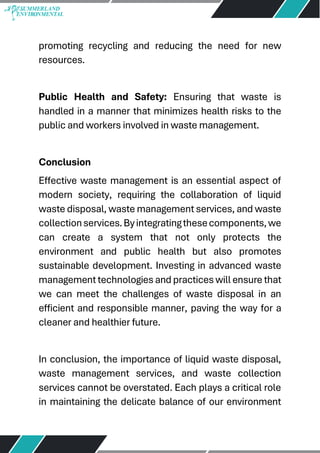The 6-Second Trick For Reclaim Waste
The 6-Second Trick For Reclaim Waste
Blog Article
The smart Trick of Reclaim Waste That Nobody is Discussing
Table of ContentsReclaim Waste for DummiesThe Reclaim Waste IdeasSome Known Details About Reclaim Waste The Best Strategy To Use For Reclaim WasteThe Single Strategy To Use For Reclaim Waste
With proper liquid waste administration, companies can lower energy-intensive treatment procedures and disposal costs. By complying with a system for taking care of liquid waste, business can stay clear of costly penalties and charges and prevent unfavorable promotion.(https://www.tripadvisor.in/Profile/reclaimwaste1)Gather depictive examples from different factors within the waste stream to ensure precision. Fluid waste, specifically unsafe ones, presents significant dangers during this step.

Disinfection (e.g., chlorination, ultraviolet light, ozonation) and nutrient elimination (e.g., denitrification and phosphorus elimination) are suggested under rigid laws. Many business violated several liquid waste disposal guidelines in current years.
6 Simple Techniques For Reclaim Waste

are utilized by markets that generate huge quantities of low-toxicity fluid waste. Shallow basins consist of liquid waste that is allowed to evaporate via all-natural processes. The residue left can be taken care of in landfills. entails shedding fluid waste at heats and converting it into gas and ash. This kind of disposal undergoes rigorous environmental laws due to possibly harmful exhausts.
The searchings for ought to be recorded, analyzed, and kept not just for entry to governing authorities but also for making improvements in the future. Share details with appropriate stakeholders (e.g., workers, regulatory government agencies, and nearby neighborhoods) to maintain transparency and responsibility.
Recognizing these can help them effectively handle their operations and reduce their environmental impact. Firms that can not spend in centers ought to think about collaborating with the public sector for better options.
The Reclaim Waste Ideas
By carrying out extensive monitoring systems that consist of treatment and reusing strategies, normal surveillance, risk evaluations, and adherence to neighborhood and federal laws, commercial centers can add to the protection of groundwater supplies, ensuring their schedule for future generations (industrial wastewater treatment). Let's delve into the relevance of efficient liquid waste monitoring in the commercial sector, concentrating on its implications for safeguarding groundwater sources
The air pollution of groundwater resources as a result of improper liquid waste management in the commercial industry has far-reaching consequences for human health and wellness, agriculture, and the atmosphere overall. Some of the prospective influences caused by such contamination include: Polluted Drinking Water Supplies: As groundwater provides a significant part of our alcohol consumption water, air pollution from industrial tasks can bring about harmful chemicals and bacteria entering our water supply, posturing wellness threats for human beings.
Reduced Agricultural Efficiency: Farming relies heavily on groundwater for watering; consequently, contaminated water can hinder plant yields, contaminate agricultural products, and impact food safety and security. Given the importance of maintaining groundwater resources, it is essential for companies to take a proactive position in managing their liquid waste properly and avoiding air pollution.
Not known Details About Reclaim Waste
Fluid waste can pollute land and pollute waters. Under the Security of the Setting Operations Act 1997, organizations that create liquid waste are required to manage it in a manner that secures the setting and the neighborhood. Info about taking care of and storing liquid waste, reacting to spills and lowering liquid waste is readily available in the adhering to truth sheets and advice:.
Water, the significance of life, is under consistent risk from contamination. The function of waste administration specialists in safeguarding this priceless source can not be overemphasized. Their services consist of: Septic system and oil trap cleaning: Essential for stopping harmful contaminants from entering our water systems. Polluted water and infected effluent management: Making sure that harmful liquids are safely eliminated and dealt with before they recommended you read can harm our water sources.
Thus, incorporating lasting liquid waste monitoring right into economic preparation enhances financial stability and shields the setting, demonstrating the worth of this approach. In verdict, adopting specialist liquid waste administration methods is critical for making sure a sustainable future, securing our atmosphere and securing the health of future generations.
When it pertains to dealing with waste, adhering to proper treatments is vital for a wide range of reasons. Correct waste disposal is not almost sanitation; it has to do with guaranteeing the health of our environment, health, and the effective usage of sources. Recognizing the value of reliable waste administration can assist all of us add to a healthier, cleaner planet.
Reclaim Waste - Truths
Efficient waste monitoring helps preserve tidy roads and public areas, decreasing the visual influence of trash and making sure that waste does not hurt wildlife. When waste is not gotten rid of properly, it can bring about pollution, where dangerous materials can seep into the soil, water systems, and the air, developing long-term ecological troubles.
Report this page